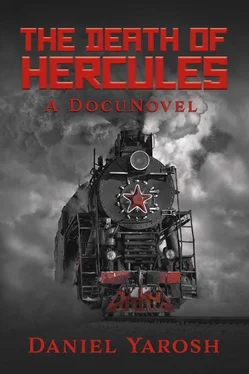“I know where to go,” he said. He drove a short distance through the narrow streets, past the Golden Gate dating from the 11th century, and turned west of the old town. He stopped just before a narrow alley. “Wait here,” he said to Deena. In a few minutes he came out with a short, stubby man in tow. “Out,” Zalmund said to Deena in a gruff voice, which seemed a put-on for the stranger. Deena obeyed and stood by the brick wall at the corner. Zalmund and the man circled the car twice, and then the man got behind the wheel and turned over the starter. He gunned the engine while Zalmund nodded. He turned off the car, and pulled a wad of currency from his pocket, which he carefully counted into Zalmund’s hand. Deena notices that they were German marks. The car disappeared into the alley, and Deena and Zalmund stood on the corner looking at each other, with the wad of marks and the clothes on their backs.
Nearby, Zalmund found an apartment in the run-down old Podol neighborhood west of the river with a hand-written sign in the window announcing a vacancy. The view out the single window was of the plaster wall of the tenement next door, but if Deena walked down the narrow street and turned right, she had a wonderful view of the Ukrainian Baroque church of St. Andrew.
The tension was gone from their lives in Kyiv, but so was their determination. In the first few days they did not talk about what had happened in Moscow. Zalmund finally told Deena about finding their friends dead in the car and at the apartment, and Deena nodded in terrified silence. Yes, she agreed, they had to leave, and quickly, the way they did.
Zalmund felt a painful betrayal. He had developed camaraderie with the men at the Lubyanka and he had attached his loyalty, maybe beyond reason, to the commanders. He had made his way to the center of the world, and now he was cast out. For what? But Zalmund also realized his shameful naiveté. What he saw now was his unwilling complicity in things about which he knew very little. It was not possible to bear witness; his observation embroiled him in the act. The pain and the shame of this Moscow summer kept Zalmund from talking about it.
Deena also spoke very little about Moscow. She got what she wanted in her time there, but it wasn’t real, and it wasn’t satisfying. Everyone spoke of ideals and the good of the People; there was excitement, and it was new. But somehow everything was twisted into a Revolutionary moment. She was self-conscious of all her desires, and examined each for motive, asking herself if it was for the People or just for herself. In the end she had to flee for her life, and this motive needed no Revolutionary explanation. She never quite got it; maybe she didn’t give enough. The Revolution made it clear that it didn’t really need her. She didn’t want to talk about it. Now she would see if she really needed the Revolution.
There was one more matter that they did not speak about. They mourned their friends alone, but they shared the guilt of surviving.
After the focused fear of Moscow, Kyiv was a hedonist oasis. With no jobs and flush with money, Zalmund and Deena strolled Bibikov Lane and enjoy the cafes of the old town. They bought fashionable clothes and shoes. They slept late and listened to jazz and politics at the coffee houses long into the night. Their favorite spot was a small brasserie on Kreschatik Street near the Hotel Bellevue. It became the gathering place for disaffected Bolsheviks who, like them, had fled the Revolution. Every night one or another unemployed singer or piano player entertained until dawn, occasionally passing around the hat, while the crowd smoked their Zodiak cigarettes and exchanged gossip about Russia with the newest émigrés. No one asked Zalmund or Deena about their past. Everyone in Kyiv had a past they would rather not discuss or were doing something now they certainly wouldn’t want to talk about.
One night Zalmund and Deena were sharing watered down vodkas with an old widow who was living in the Bellevue. She had a hard edge which softened with each taste. Finally, she cried about her lost husband, who left her some bank notes.
“I know he had more!” she whispered to them, glancing around the room.
“You do?” Deena leaned forward.
“He never told me everything. He left me something to live on, but he must have had more than that.” She looked over her shoulder.
“Maybe you know who he did business with. They might know more,” Zalmund offered.
“Who he did business with is nobody’s business,” she slurred, and took another sip of her drink. “The old days don’t count for much, now.”
Zalmund nodded, and Deena leaned back.
“It was a few weeks ago, maybe July,” the widow continued, “a dandy not from here” she nodded with exaggeration, meaning that he was from the Russian side of the border, “was carrying on all night. He was talking loud and spending money on drinks for everyone, mostly on the free girls,” and she nodded her head toward two colorfully dressed prostitutes sitting hopefully at a table, without drinks and scanning the incoming clientele. “He was saying what he could get in Moscow, what he could get here, that he could take care of anybody.” She took another sip. “The next day they found him dead in a wagon on Vasilkov’skaja. The police said it was robbery, but I heard that he still had his money, and the police took it. He had one shot to the back of the head.” She pointed to the base of her skull. Zalmund and Deena looked at each other. A signature of the Cheka. “Somebody on the other side worried about him talking,” she nodded. “They sent people to stop it.”
“They knew he was here? Here?” Deena asked.
“The Bolsheviks don’t know what goes on in Kyiv?” she looked at them, side to side. “Don’t be foolish. They let the caviar in here. They have people in this town. They can shut a mouth anywhere in this city.”
Under the table, Deena sought Zalmund’s hand. They squeezed, while their eyes met. It was the first time in weeks they thought that maybe they were not yet safe.
The widow grumbled a Polish toast and downed the rest of her drink. Deena and Zalmund followed.
In the succeeding days, Zalmund let his beard grow. They discarded their flashy clothing and began to dress in the bohemian style of the Kyiv sophisticates.
**********
This Kyiv was almost everything they dreamed about when they lived in Koszuty. The Koszuty Mansion had been bought by Napoleon Rekowski, a szlachta zasciankowa , or noble with a small landholding, in 1850. His daughter Maria married the Polish patriot Witold Kosiński in 1875, and the couple took over running the estate, leaving the elder Rekowski’s to live as idle nobility.
Zalmund’s father, Isaak, was an overseer of the Koszuty estate. Isaak started as the bookkeeper for the elder Rekowski. Kosiński kept him on because of his familiarity with the operations, and certainly not because he liked Jews. Isaak was successful in organizing the house accounts, and since the Kosiński couple produced no heirs, Isaak continued on inconspicuously managing the business of the estate while the Kosiński’s maintained their social and political circles. At the turn of the century, Isaak guided the addition of a small shoe making operation and then a leather goods shop to the estate. When Maria Kosiński died in 1911 Witold held a wake and funeral the size of which Koszuty had never seen.
Isaak’s reward for his work was to be assigned the task of collecting rents and taxes from the tenant farmers and shopkeepers of the estate. As was tradition, Witold gave Isaak a commission on whatever he collected. Over the years, Isaak grew rich, at the cost of the resentment of the Catholic townspeople. Isaak moved his family from an apartment above a bread shop in the nearby Jewish village to a stand-alone wooden house on the grounds of the Mansion. He had dreams of a dynasty and purchased a seat in the synagogue on the front row on the east side, a place of honor. His wife, Miriam, was a meek and unpretentious woman. She kept a traditional house for her husband and son Zalmund and enjoyed a pious life. Her health was never good after a miscarriage when Zalmund was four. She was uncomfortable with the move from the apartment right before Zalmund’s bar mitzvah. Isaak insisted on hiring an older Catholic widow from the town to serve as a maid to relieve Miriam of the household tasks. Although his intentions were benevolent, he took from Miriam her identity that she had learned from her mother. She took to her bed, and Zalmund did not remember her often leaving that room of their house.
Читать дальше












